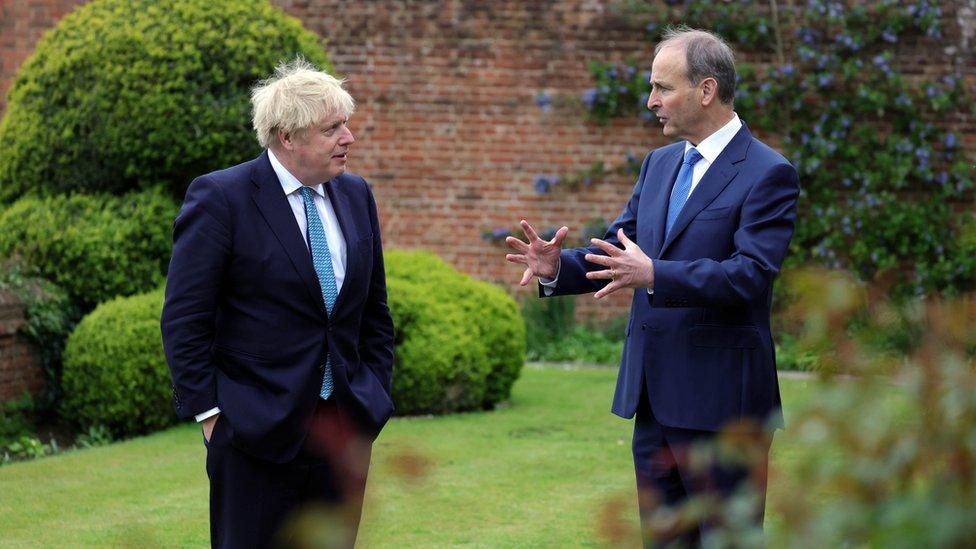UK and Irish PMs hold talks amid Northern Ireland tensions
- Published

Boris Johnson and Taoiseach Micheal Martin have discussed the Ballymurphy massacre and post-Brexit trade during a meeting at Chequers.
The talks came days after the conclusion of the Ballymurphy inquest.
The coroner said the 10 people killed in Belfast in 1971 following an Army operation were "entirely innocent".
A Downing Street spokeswoman said both men agreed "it was profoundly sad that the families of victims had to wait so long for the truth".
The two leaders also agreed on the importance of finding "a way forward in Northern Ireland that delivers for victims and aids truth recovery".
In a tweet, Mr Martin welcomed, external "wide-ranging and constructive discussions with Boris Johnson today on British-Irish relations, including the long struggle for justice by the Ballymurphy families.
Earlier this week, the prime minister wrote to the families of the victims - who received the letter minutes before Northern Ireland Secretary Brandon Lewis apologised in Parliament for "the events at Ballymurphy".
But the families were angered by the tone and timing of the correspondence.
The Chequers meeting also took place amid rows in Westminster over the protection of veterans from unfounded prosecutions.
Soldiers who served in Northern Ireland are excluded from the government's Overseas Operations Bill - a decision which led to the resignation of defence minister Jonny Mercer.
Mr Johnson has said the government is "committed to doing more over the coming months, including for those who have served in Northern Ireland".
But last week, Mr Martin warned that introducing a form of amnesty on Troubles prosecutions would represent a "breach of trust" - appearing to scrap a key mechanism agreed by the UK and Irish governments and main Northern Ireland parties in the 2014 Stormont House Agreement.
Tensions have been rising in Northern Ireland over recent weeks, with violence on the streets.
Protest in several towns and cities last month were thought to have been prompted by a decision not to prosecute senior members of Sinn Fein for alleged Covid-19 breaches at the funeral of a senior republican.
But the fallout of Brexit was also thought to have played its part, with the deal between the UK and EU seeing new border restrictions placed in the Irish Sea, leading to anger from unionists and loyalists.
Following their meeting, Mr Johnson and Mr Martin restated the importance "of working together to uphold the Belfast/Good Friday Agreement and to maintain smooth trade between Great Britain, Northern Ireland and the Republic of Ireland".
DUP leadership contest
Meanwhile, Edwin Poots has been elected the new leader of the DUP replacing Arlene Foster who was forced to resign after party members revolted against her.
Mr Poots has pledged to increase opposition to the Northern Ireland Protocol - even if it risks collapsing Stormont.
Unionist political leaders are also bringing a legal challenge to protocol - which sees Northern Ireland remain a part of the EU's single market for goods and enforces EU customs rules at its ports - to Belfast's High Court.
They say the protocol breaches the Act of Union and the 1998 Good Friday peace agreement.
Earlier this week, Brexit Minister Lord Frost said it was hard to see that the way the protocol is currently operating "can be sustainable for long".
The meeting between Mr Johnson and Mr Martin was arranged "some time ago", according to an Irish government spokesman.